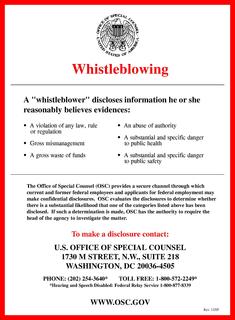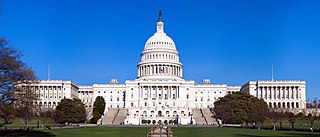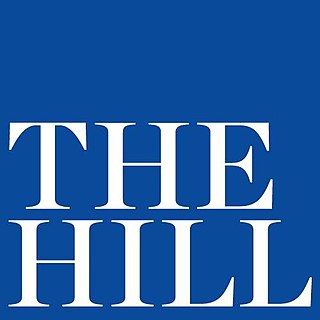
The United States is a federal republic in which the President, Congress and federal courts share powers reserved to the national government, according to its Constitution. The federal government shares sovereignty with the state governments.

The Federal Government of the United States is the national government of the United States, a federal republic in North America, composed of 50 states, a federal district, five major self-governing territories, and several island possessions. The federal government is composed of three distinct branches: legislative, executive, and judicial, whose powers are vested by the U.S. Constitution in the Congress, the President, and the federal courts, respectively. The powers and duties of these branches are further defined by acts of congress, including the creation of executive departments and courts inferior to the Supreme Court.
Contempt of Congress is the act of obstructing the work of the United States Congress or one of its committees. Historically, the bribery of a U.S. Senator or U.S. Representative was considered contempt of Congress. In modern times, contempt of Congress has generally applied to the refusal to comply with a subpoena issued by a Congressional committee or subcommittee—usually seeking to compel either testimony or the production of requested documents.

Henry Arnold Waxman is an American politician who served as the U.S. Representative for California's 33rd congressional district from 1975 until 2015. Waxman is a member of the Democratic Party. His district included much of the western part of the city of Los Angeles, as well as West Hollywood, Santa Monica and Beverly Hills, and was numbered the 24th district from 1975 to 1993, the 29th district from 1993 to 2003, and the 30th district from 2003 to 2013, changing due to redistricting after the 1990, 2000 and 2010 censuses. He now serves as Chairman at Waxman Strategies, a DC-based communications and lobbying firm, working on issues like health care, environment, energy, technology and telecommunications. In addition, he serves as a Regent Lecturer for University of California, Los Angeles, and as an advisor and lecturer at the Johns Hopkins Bloomberg School of Public Health.

The Committee on Oversight and Reform is the main investigative committee of the United States House of Representatives.
The National Security Whistleblowers Coalition (NSWBC), founded in 2004 by former FBI translator Sibel Edmonds in league with over 50 former and current United States government officials from more than a dozen agencies, is an independent, nonpartisan alliance of whistleblowers who have come forward to address weaknesses of US security agencies.
Congressional oversight is oversight by the United States Congress over the Executive Branch, including the numerous U.S. federal agencies. Congressional oversight includes the review, monitoring, and supervision of federal agencies, programs, activities, and policy implementation. Congress exercises this power largely through its congressional committee system. Oversight also occurs in a wide variety of congressional activities and contexts. These include authorization, appropriations, investigative, and legislative hearings by standing committees; specialized investigations by select committees; and reviews and studies by congressional support agencies and staff.
The Privacy and Civil Liberties Oversight Board (PCLOB) is an independent agency within the executive branch of the United States government, established by Congress in 2004 to advise the President and other senior executive branch officials to ensure that concerns with respect to privacy and civil liberties in the United States are appropriately considered in the development and implementation of all laws, regulations, and executive branch policies related to terrorism.
The Lloyd–La Follette Act of 1912 began the process of protecting civil servants in the United States from unwarranted or abusive removal by codifying "just cause" standards previously embodied in presidential orders. It defines "just causes" as those that would promote the "efficiency of the service." August 24, 1912, § 6, 37 Stat. 555, 5 U.S.C. § 7511
The anti-gag statute is a little-known legal boundary in the long struggle in the United States between Executive Branch secrecy and the United States Congress and the public’s right to know. Since 1988, the statute has been an annual appropriations restriction drawing the line on Executive branch efforts to limit whistleblowing disclosures to information that is specifically identified in advance as classified. The anti-gag statute requires a mandatory, specifically worded addendum on any nondisclosure policy, form or agreement to legally spend money to implement or enforce the gag order.
The Employee Free Choice Act is the name for several legislative bills on US labor law which have been proposed and sometimes introduced into one or both chambers of the U.S. Congress.
During the 2007 Congressional investigation of the dismissal of eight U.S. attorneys, it was discovered that administration officials had been using a private Internet domain, called gwb43.com, owned by and hosted on an email server run by the Republican National Committee, for various official communications. The domain name is an abbreviation for "George W. Bush, 43rd" President of the United States. The use of this email domain became public when it was discovered that Scott Jennings, the White House's deputy director of political affairs, was using a gwb43.com email address to discuss the firing of the U.S. attorney for Arkansas. Communications by federal employees were also found on georgewbush.com and rnchq.org. Congressional requests for administration documents while investigating the dismissals of the U.S. attorneys required the Bush administration to reveal that not all internal White House emails were available. Conducting governmental business in this manner is a possible violation of the Presidential Records Act of 1978. Over 5 million emails may have been lost. Greg Palast claims to have come up with 500 of the Karl Rove emails, leading to damaging allegations. In 2009, it was announced that as many as 22 million emails may have been lost.

The structure of the United States Congress with a separate House and Senate is complex with numerous committees handling a disparate array of topics presided over by elected officers. Some committees manage other committees. Congresspersons have various privileges to help the presidents serve the national interest and are paid a salary and have pensions. Congress formed a Library of Congress to help assist investigations and developed a Government Accountability Office to help it analyze complex and varied federal expenditures.

A whistleblower is a person who exposes any kind of information or activity that is deemed illegal, unethical, or not correct within an organization that is either private or public. The Whistleblower Protection Act was made into federal law in the United States in 1989.

The Stop Trading on Congressional Knowledge (STOCK) Act is an Act of Congress designed to combat insider trading. It was signed into law by President Barack Obama on April 4, 2012. The bill prohibits the use of non-public information for private profit, including insider trading by members of Congress and other government employees. It confirms changes to the Commodity Exchange Act, specifies reporting intervals for financial transactions.

The Federal Information Technology Acquisition Reform Act made changes to the ways the U.S. federal government buys and manages computer technology. It became law as a part of the National Defense Authorization Act for Fiscal Year 2015 (Title VIII, Subtitle D, H.R. 3979.

The Presidential and Federal Records Act Amendments of 2014 is a United States federal statute which amended the Presidential Records Act and Federal Records Act. Introduced as H.R. 1233, it was signed into law by President Barack Obama on November 26, 2014.

The Federal Reserve Transparency Act of 2013 is a bill that would direct the Government Accountability Office (GAO) to prepare, within 12 months of enactment, an audit of the Board of Governors of the Federal Reserve System and the Federal Reserve Banks.

The Senior Executive Service Accountability Act is a bill that would make it less difficult to fire or suspend members of the Senior Executive Service (SES).












